Organizational Behavior at BBC: Culture, Motivation, and Team Dynamics
VerifiedAdded on 2023/02/03
|13
|4064
|92
Report
AI Summary
This report provides a comprehensive analysis of organizational behavior within the BBC, examining the company's evolution from a power-based culture to a more person-oriented one. It explores key concepts such as organizational culture, power dynamics, and political behavior, contrasting the pre-2015 environment with the changes implemented by the new Director General. The report delves into employee motivation, applying theories like Maslow's Hierarchy of Needs and McClelland's Needs Theory to suggest strategies for enhancing individual and team performance. It also examines the different types of teams within the BBC and their importance, as well as identifying barriers to effective teamwork and suggesting improvements. The study highlights the impact of improved motivation on achieving organizational goals, including increased staff retention, easier goal attainment, a better work culture, and more creative and innovative ideas. The report concludes with a discussion of how the BBC can continue to foster a positive and productive work environment.
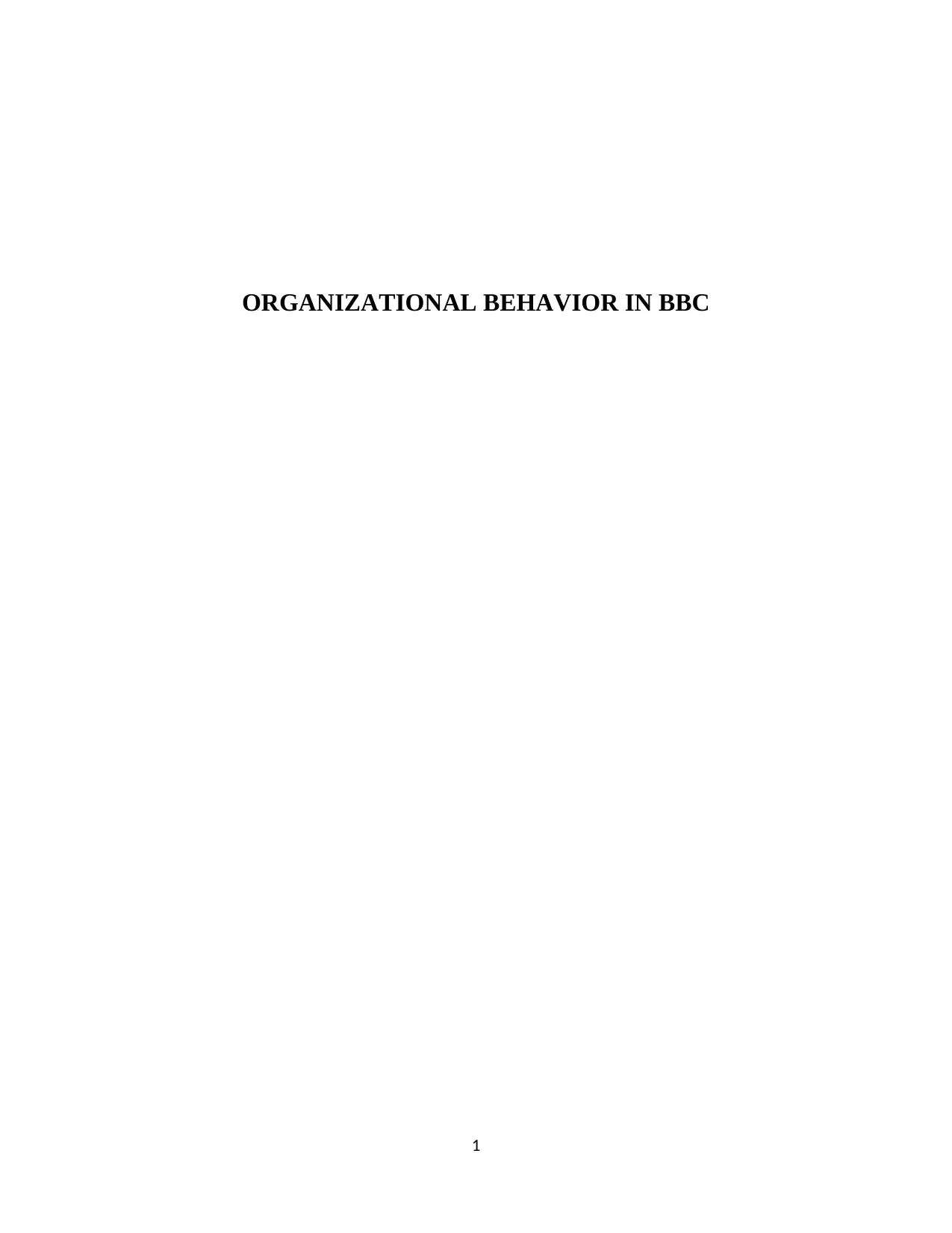
ORGANIZATIONAL BEHAVIOR IN BBC
1
1
Paraphrase This Document
Need a fresh take? Get an instant paraphrase of this document with our AI Paraphraser
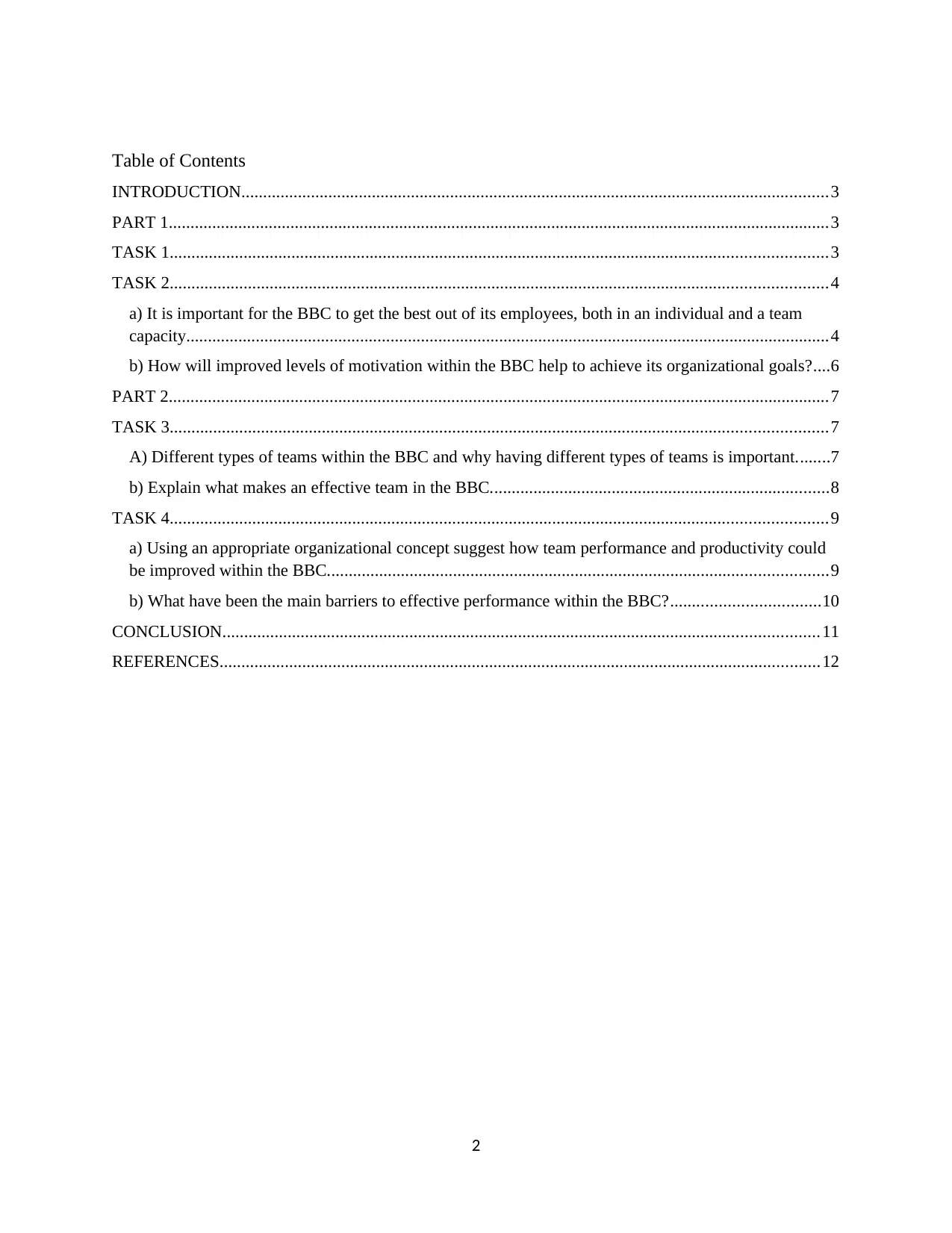
Table of Contents
INTRODUCTION.......................................................................................................................................3
PART 1........................................................................................................................................................3
TASK 1.......................................................................................................................................................3
TASK 2.......................................................................................................................................................4
a) It is important for the BBC to get the best out of its employees, both in an individual and a team
capacity....................................................................................................................................................4
b) How will improved levels of motivation within the BBC help to achieve its organizational goals?....6
PART 2........................................................................................................................................................7
TASK 3.......................................................................................................................................................7
A) Different types of teams within the BBC and why having different types of teams is important........7
b) Explain what makes an effective team in the BBC..............................................................................8
TASK 4.......................................................................................................................................................9
a) Using an appropriate organizational concept suggest how team performance and productivity could
be improved within the BBC...................................................................................................................9
b) What have been the main barriers to effective performance within the BBC?..................................10
CONCLUSION.........................................................................................................................................11
REFERENCES..........................................................................................................................................12
2
INTRODUCTION.......................................................................................................................................3
PART 1........................................................................................................................................................3
TASK 1.......................................................................................................................................................3
TASK 2.......................................................................................................................................................4
a) It is important for the BBC to get the best out of its employees, both in an individual and a team
capacity....................................................................................................................................................4
b) How will improved levels of motivation within the BBC help to achieve its organizational goals?....6
PART 2........................................................................................................................................................7
TASK 3.......................................................................................................................................................7
A) Different types of teams within the BBC and why having different types of teams is important........7
b) Explain what makes an effective team in the BBC..............................................................................8
TASK 4.......................................................................................................................................................9
a) Using an appropriate organizational concept suggest how team performance and productivity could
be improved within the BBC...................................................................................................................9
b) What have been the main barriers to effective performance within the BBC?..................................10
CONCLUSION.........................................................................................................................................11
REFERENCES..........................................................................................................................................12
2
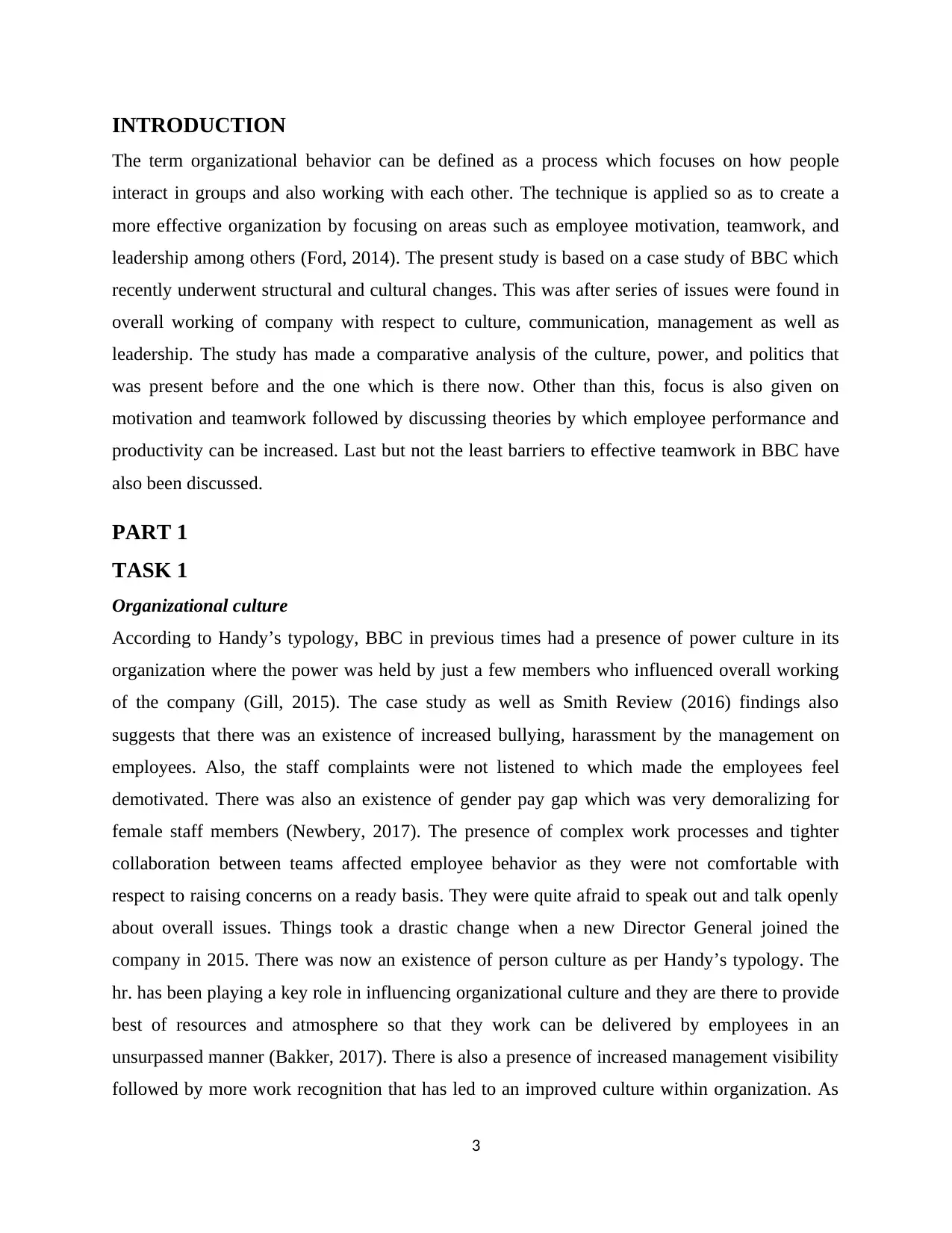
INTRODUCTION
The term organizational behavior can be defined as a process which focuses on how people
interact in groups and also working with each other. The technique is applied so as to create a
more effective organization by focusing on areas such as employee motivation, teamwork, and
leadership among others (Ford, 2014). The present study is based on a case study of BBC which
recently underwent structural and cultural changes. This was after series of issues were found in
overall working of company with respect to culture, communication, management as well as
leadership. The study has made a comparative analysis of the culture, power, and politics that
was present before and the one which is there now. Other than this, focus is also given on
motivation and teamwork followed by discussing theories by which employee performance and
productivity can be increased. Last but not the least barriers to effective teamwork in BBC have
also been discussed.
PART 1
TASK 1
Organizational culture
According to Handy’s typology, BBC in previous times had a presence of power culture in its
organization where the power was held by just a few members who influenced overall working
of the company (Gill, 2015). The case study as well as Smith Review (2016) findings also
suggests that there was an existence of increased bullying, harassment by the management on
employees. Also, the staff complaints were not listened to which made the employees feel
demotivated. There was also an existence of gender pay gap which was very demoralizing for
female staff members (Newbery, 2017). The presence of complex work processes and tighter
collaboration between teams affected employee behavior as they were not comfortable with
respect to raising concerns on a ready basis. They were quite afraid to speak out and talk openly
about overall issues. Things took a drastic change when a new Director General joined the
company in 2015. There was now an existence of person culture as per Handy’s typology. The
hr. has been playing a key role in influencing organizational culture and they are there to provide
best of resources and atmosphere so that they work can be delivered by employees in an
unsurpassed manner (Bakker, 2017). There is also a presence of increased management visibility
followed by more work recognition that has led to an improved culture within organization. As
3
The term organizational behavior can be defined as a process which focuses on how people
interact in groups and also working with each other. The technique is applied so as to create a
more effective organization by focusing on areas such as employee motivation, teamwork, and
leadership among others (Ford, 2014). The present study is based on a case study of BBC which
recently underwent structural and cultural changes. This was after series of issues were found in
overall working of company with respect to culture, communication, management as well as
leadership. The study has made a comparative analysis of the culture, power, and politics that
was present before and the one which is there now. Other than this, focus is also given on
motivation and teamwork followed by discussing theories by which employee performance and
productivity can be increased. Last but not the least barriers to effective teamwork in BBC have
also been discussed.
PART 1
TASK 1
Organizational culture
According to Handy’s typology, BBC in previous times had a presence of power culture in its
organization where the power was held by just a few members who influenced overall working
of the company (Gill, 2015). The case study as well as Smith Review (2016) findings also
suggests that there was an existence of increased bullying, harassment by the management on
employees. Also, the staff complaints were not listened to which made the employees feel
demotivated. There was also an existence of gender pay gap which was very demoralizing for
female staff members (Newbery, 2017). The presence of complex work processes and tighter
collaboration between teams affected employee behavior as they were not comfortable with
respect to raising concerns on a ready basis. They were quite afraid to speak out and talk openly
about overall issues. Things took a drastic change when a new Director General joined the
company in 2015. There was now an existence of person culture as per Handy’s typology. The
hr. has been playing a key role in influencing organizational culture and they are there to provide
best of resources and atmosphere so that they work can be delivered by employees in an
unsurpassed manner (Bakker, 2017). There is also a presence of increased management visibility
followed by more work recognition that has led to an improved culture within organization. As
3
⊘ This is a preview!⊘
Do you want full access?
Subscribe today to unlock all pages.

Trusted by 1+ million students worldwide
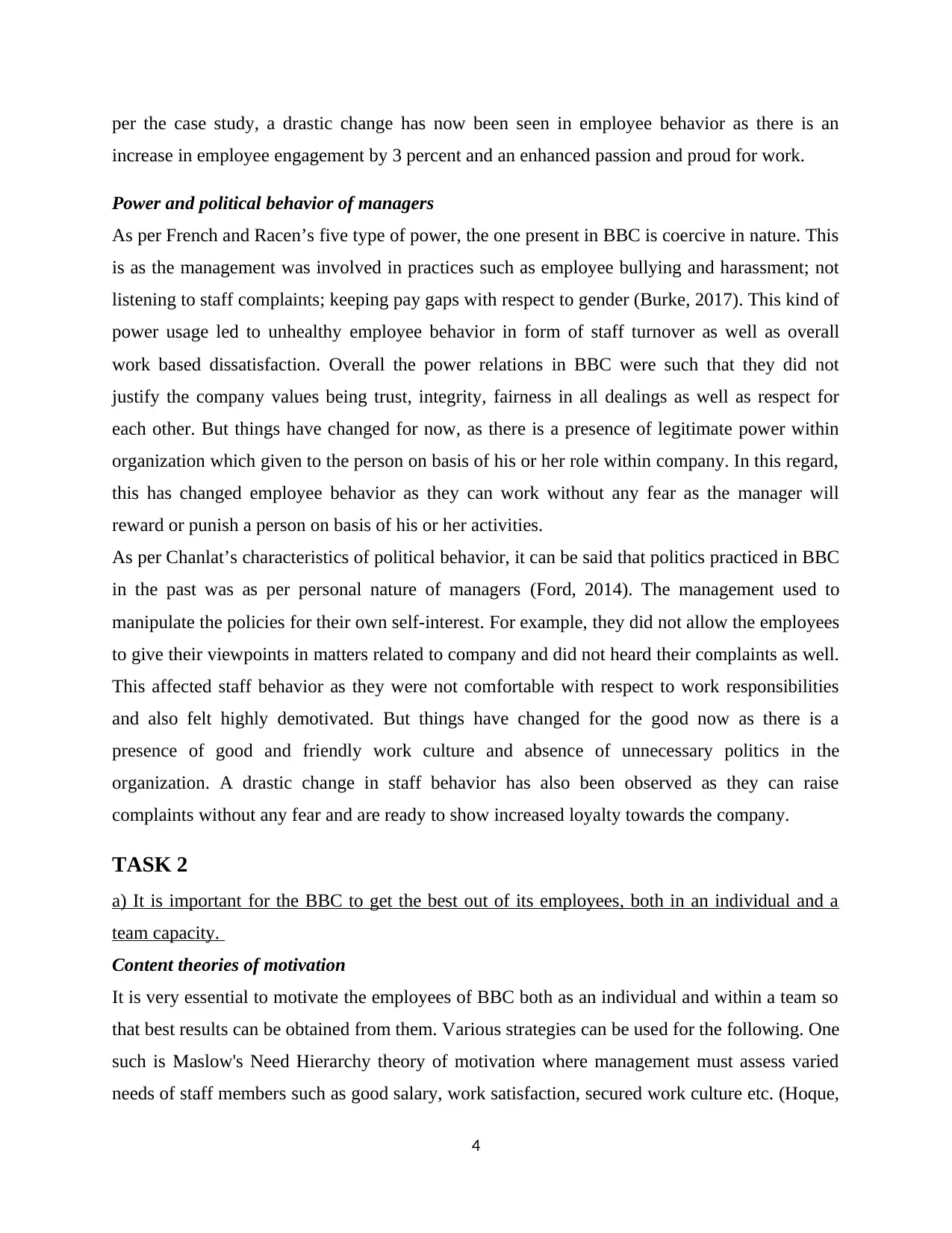
per the case study, a drastic change has now been seen in employee behavior as there is an
increase in employee engagement by 3 percent and an enhanced passion and proud for work.
Power and political behavior of managers
As per French and Racen’s five type of power, the one present in BBC is coercive in nature. This
is as the management was involved in practices such as employee bullying and harassment; not
listening to staff complaints; keeping pay gaps with respect to gender (Burke, 2017). This kind of
power usage led to unhealthy employee behavior in form of staff turnover as well as overall
work based dissatisfaction. Overall the power relations in BBC were such that they did not
justify the company values being trust, integrity, fairness in all dealings as well as respect for
each other. But things have changed for now, as there is a presence of legitimate power within
organization which given to the person on basis of his or her role within company. In this regard,
this has changed employee behavior as they can work without any fear as the manager will
reward or punish a person on basis of his or her activities.
As per Chanlat’s characteristics of political behavior, it can be said that politics practiced in BBC
in the past was as per personal nature of managers (Ford, 2014). The management used to
manipulate the policies for their own self-interest. For example, they did not allow the employees
to give their viewpoints in matters related to company and did not heard their complaints as well.
This affected staff behavior as they were not comfortable with respect to work responsibilities
and also felt highly demotivated. But things have changed for the good now as there is a
presence of good and friendly work culture and absence of unnecessary politics in the
organization. A drastic change in staff behavior has also been observed as they can raise
complaints without any fear and are ready to show increased loyalty towards the company.
TASK 2
a) It is important for the BBC to get the best out of its employees, both in an individual and a
team capacity.
Content theories of motivation
It is very essential to motivate the employees of BBC both as an individual and within a team so
that best results can be obtained from them. Various strategies can be used for the following. One
such is Maslow's Need Hierarchy theory of motivation where management must assess varied
needs of staff members such as good salary, work satisfaction, secured work culture etc. (Hoque,
4
increase in employee engagement by 3 percent and an enhanced passion and proud for work.
Power and political behavior of managers
As per French and Racen’s five type of power, the one present in BBC is coercive in nature. This
is as the management was involved in practices such as employee bullying and harassment; not
listening to staff complaints; keeping pay gaps with respect to gender (Burke, 2017). This kind of
power usage led to unhealthy employee behavior in form of staff turnover as well as overall
work based dissatisfaction. Overall the power relations in BBC were such that they did not
justify the company values being trust, integrity, fairness in all dealings as well as respect for
each other. But things have changed for now, as there is a presence of legitimate power within
organization which given to the person on basis of his or her role within company. In this regard,
this has changed employee behavior as they can work without any fear as the manager will
reward or punish a person on basis of his or her activities.
As per Chanlat’s characteristics of political behavior, it can be said that politics practiced in BBC
in the past was as per personal nature of managers (Ford, 2014). The management used to
manipulate the policies for their own self-interest. For example, they did not allow the employees
to give their viewpoints in matters related to company and did not heard their complaints as well.
This affected staff behavior as they were not comfortable with respect to work responsibilities
and also felt highly demotivated. But things have changed for the good now as there is a
presence of good and friendly work culture and absence of unnecessary politics in the
organization. A drastic change in staff behavior has also been observed as they can raise
complaints without any fear and are ready to show increased loyalty towards the company.
TASK 2
a) It is important for the BBC to get the best out of its employees, both in an individual and a
team capacity.
Content theories of motivation
It is very essential to motivate the employees of BBC both as an individual and within a team so
that best results can be obtained from them. Various strategies can be used for the following. One
such is Maslow's Need Hierarchy theory of motivation where management must assess varied
needs of staff members such as good salary, work satisfaction, secured work culture etc. (Hoque,
4
Paraphrase This Document
Need a fresh take? Get an instant paraphrase of this document with our AI Paraphraser
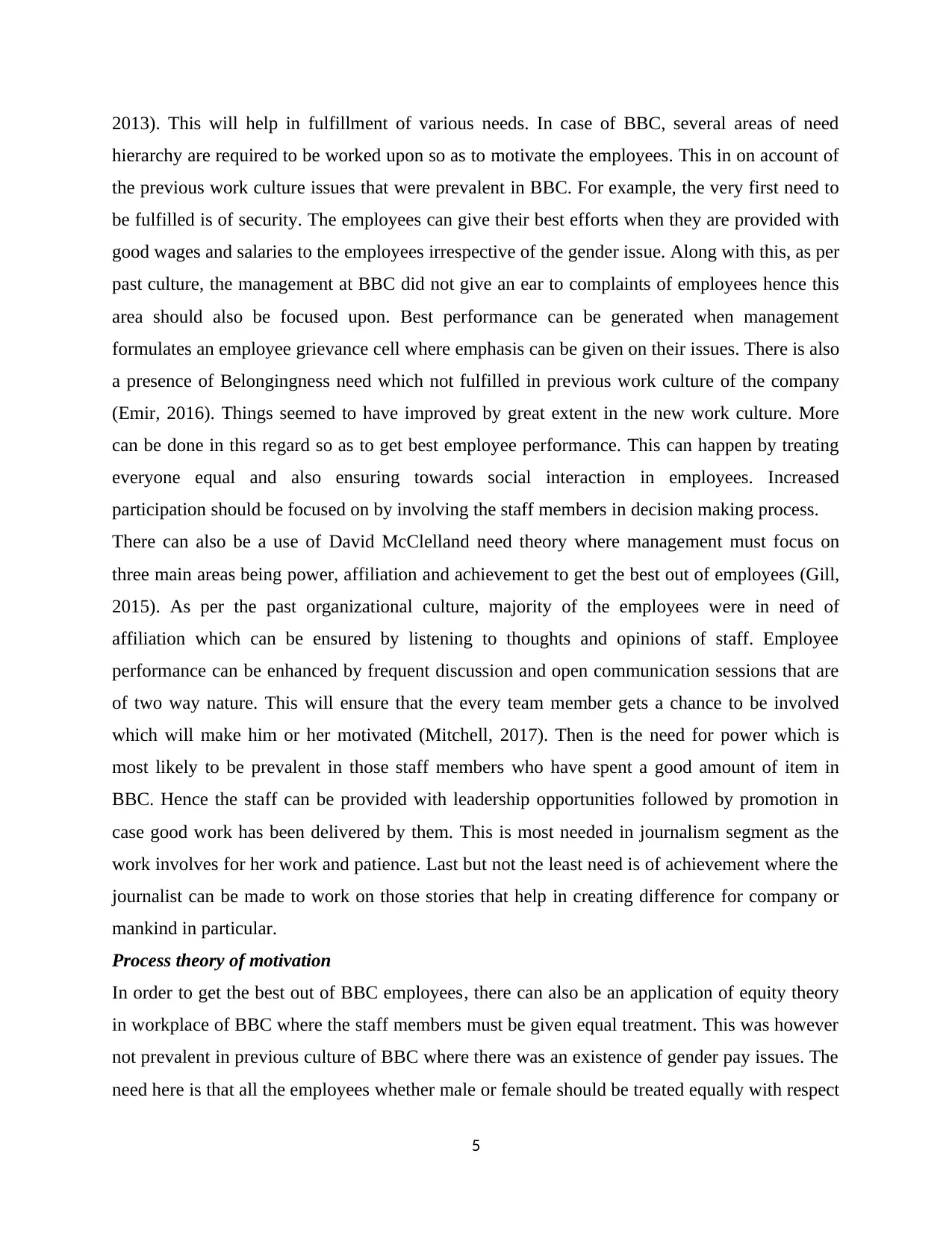
2013). This will help in fulfillment of various needs. In case of BBC, several areas of need
hierarchy are required to be worked upon so as to motivate the employees. This in on account of
the previous work culture issues that were prevalent in BBC. For example, the very first need to
be fulfilled is of security. The employees can give their best efforts when they are provided with
good wages and salaries to the employees irrespective of the gender issue. Along with this, as per
past culture, the management at BBC did not give an ear to complaints of employees hence this
area should also be focused upon. Best performance can be generated when management
formulates an employee grievance cell where emphasis can be given on their issues. There is also
a presence of Belongingness need which not fulfilled in previous work culture of the company
(Emir, 2016). Things seemed to have improved by great extent in the new work culture. More
can be done in this regard so as to get best employee performance. This can happen by treating
everyone equal and also ensuring towards social interaction in employees. Increased
participation should be focused on by involving the staff members in decision making process.
There can also be a use of David McClelland need theory where management must focus on
three main areas being power, affiliation and achievement to get the best out of employees (Gill,
2015). As per the past organizational culture, majority of the employees were in need of
affiliation which can be ensured by listening to thoughts and opinions of staff. Employee
performance can be enhanced by frequent discussion and open communication sessions that are
of two way nature. This will ensure that the every team member gets a chance to be involved
which will make him or her motivated (Mitchell, 2017). Then is the need for power which is
most likely to be prevalent in those staff members who have spent a good amount of item in
BBC. Hence the staff can be provided with leadership opportunities followed by promotion in
case good work has been delivered by them. This is most needed in journalism segment as the
work involves for her work and patience. Last but not the least need is of achievement where the
journalist can be made to work on those stories that help in creating difference for company or
mankind in particular.
Process theory of motivation
In order to get the best out of BBC employees, there can also be an application of equity theory
in workplace of BBC where the staff members must be given equal treatment. This was however
not prevalent in previous culture of BBC where there was an existence of gender pay issues. The
need here is that all the employees whether male or female should be treated equally with respect
5
hierarchy are required to be worked upon so as to motivate the employees. This in on account of
the previous work culture issues that were prevalent in BBC. For example, the very first need to
be fulfilled is of security. The employees can give their best efforts when they are provided with
good wages and salaries to the employees irrespective of the gender issue. Along with this, as per
past culture, the management at BBC did not give an ear to complaints of employees hence this
area should also be focused upon. Best performance can be generated when management
formulates an employee grievance cell where emphasis can be given on their issues. There is also
a presence of Belongingness need which not fulfilled in previous work culture of the company
(Emir, 2016). Things seemed to have improved by great extent in the new work culture. More
can be done in this regard so as to get best employee performance. This can happen by treating
everyone equal and also ensuring towards social interaction in employees. Increased
participation should be focused on by involving the staff members in decision making process.
There can also be a use of David McClelland need theory where management must focus on
three main areas being power, affiliation and achievement to get the best out of employees (Gill,
2015). As per the past organizational culture, majority of the employees were in need of
affiliation which can be ensured by listening to thoughts and opinions of staff. Employee
performance can be enhanced by frequent discussion and open communication sessions that are
of two way nature. This will ensure that the every team member gets a chance to be involved
which will make him or her motivated (Mitchell, 2017). Then is the need for power which is
most likely to be prevalent in those staff members who have spent a good amount of item in
BBC. Hence the staff can be provided with leadership opportunities followed by promotion in
case good work has been delivered by them. This is most needed in journalism segment as the
work involves for her work and patience. Last but not the least need is of achievement where the
journalist can be made to work on those stories that help in creating difference for company or
mankind in particular.
Process theory of motivation
In order to get the best out of BBC employees, there can also be an application of equity theory
in workplace of BBC where the staff members must be given equal treatment. This was however
not prevalent in previous culture of BBC where there was an existence of gender pay issues. The
need here is that all the employees whether male or female should be treated equally with respect
5
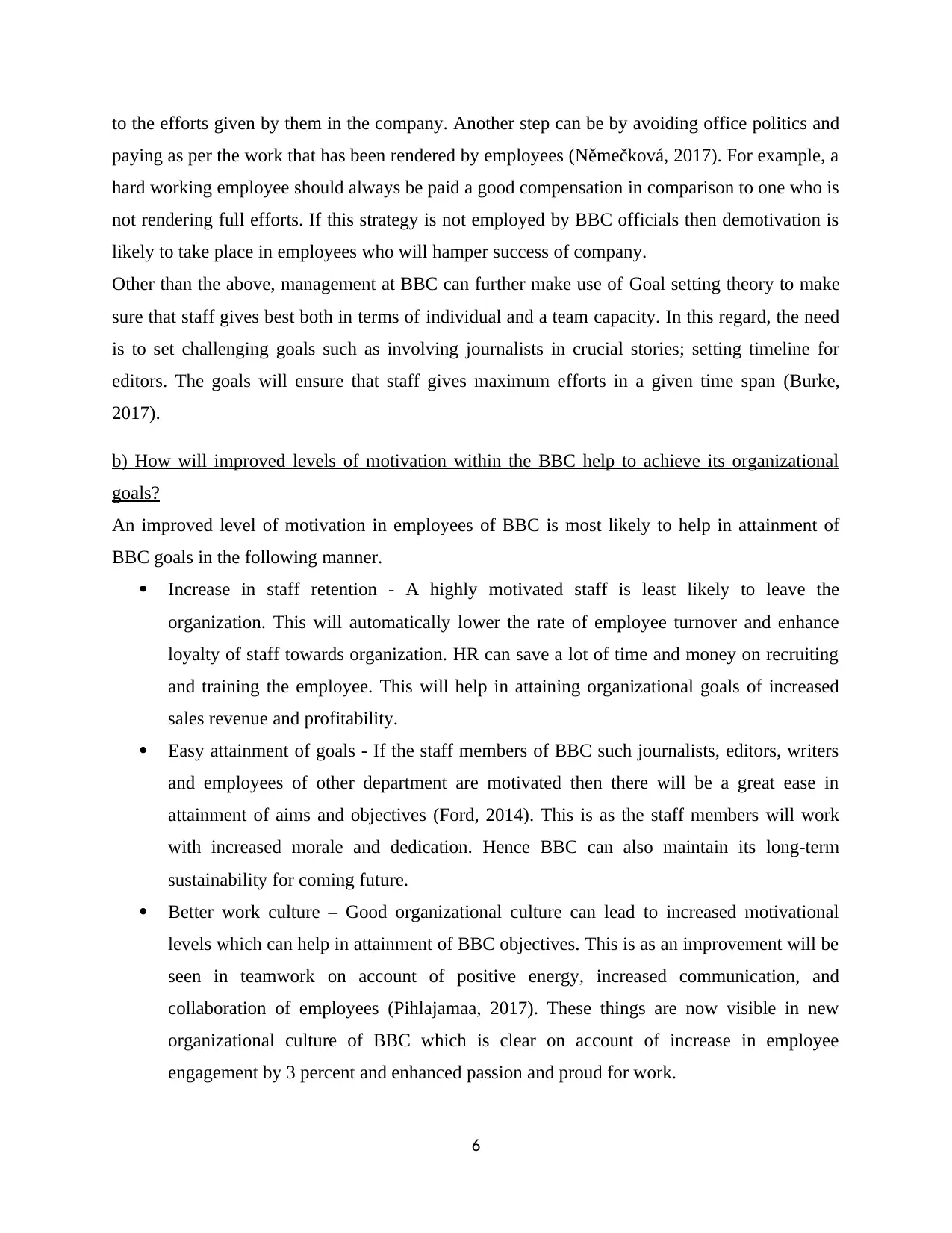
to the efforts given by them in the company. Another step can be by avoiding office politics and
paying as per the work that has been rendered by employees (Němečková, 2017). For example, a
hard working employee should always be paid a good compensation in comparison to one who is
not rendering full efforts. If this strategy is not employed by BBC officials then demotivation is
likely to take place in employees who will hamper success of company.
Other than the above, management at BBC can further make use of Goal setting theory to make
sure that staff gives best both in terms of individual and a team capacity. In this regard, the need
is to set challenging goals such as involving journalists in crucial stories; setting timeline for
editors. The goals will ensure that staff gives maximum efforts in a given time span (Burke,
2017).
b) How will improved levels of motivation within the BBC help to achieve its organizational
goals?
An improved level of motivation in employees of BBC is most likely to help in attainment of
BBC goals in the following manner.
Increase in staff retention - A highly motivated staff is least likely to leave the
organization. This will automatically lower the rate of employee turnover and enhance
loyalty of staff towards organization. HR can save a lot of time and money on recruiting
and training the employee. This will help in attaining organizational goals of increased
sales revenue and profitability.
Easy attainment of goals - If the staff members of BBC such journalists, editors, writers
and employees of other department are motivated then there will be a great ease in
attainment of aims and objectives (Ford, 2014). This is as the staff members will work
with increased morale and dedication. Hence BBC can also maintain its long-term
sustainability for coming future.
Better work culture – Good organizational culture can lead to increased motivational
levels which can help in attainment of BBC objectives. This is as an improvement will be
seen in teamwork on account of positive energy, increased communication, and
collaboration of employees (Pihlajamaa, 2017). These things are now visible in new
organizational culture of BBC which is clear on account of increase in employee
engagement by 3 percent and enhanced passion and proud for work.
6
paying as per the work that has been rendered by employees (Němečková, 2017). For example, a
hard working employee should always be paid a good compensation in comparison to one who is
not rendering full efforts. If this strategy is not employed by BBC officials then demotivation is
likely to take place in employees who will hamper success of company.
Other than the above, management at BBC can further make use of Goal setting theory to make
sure that staff gives best both in terms of individual and a team capacity. In this regard, the need
is to set challenging goals such as involving journalists in crucial stories; setting timeline for
editors. The goals will ensure that staff gives maximum efforts in a given time span (Burke,
2017).
b) How will improved levels of motivation within the BBC help to achieve its organizational
goals?
An improved level of motivation in employees of BBC is most likely to help in attainment of
BBC goals in the following manner.
Increase in staff retention - A highly motivated staff is least likely to leave the
organization. This will automatically lower the rate of employee turnover and enhance
loyalty of staff towards organization. HR can save a lot of time and money on recruiting
and training the employee. This will help in attaining organizational goals of increased
sales revenue and profitability.
Easy attainment of goals - If the staff members of BBC such journalists, editors, writers
and employees of other department are motivated then there will be a great ease in
attainment of aims and objectives (Ford, 2014). This is as the staff members will work
with increased morale and dedication. Hence BBC can also maintain its long-term
sustainability for coming future.
Better work culture – Good organizational culture can lead to increased motivational
levels which can help in attainment of BBC objectives. This is as an improvement will be
seen in teamwork on account of positive energy, increased communication, and
collaboration of employees (Pihlajamaa, 2017). These things are now visible in new
organizational culture of BBC which is clear on account of increase in employee
engagement by 3 percent and enhanced passion and proud for work.
6
⊘ This is a preview!⊘
Do you want full access?
Subscribe today to unlock all pages.

Trusted by 1+ million students worldwide
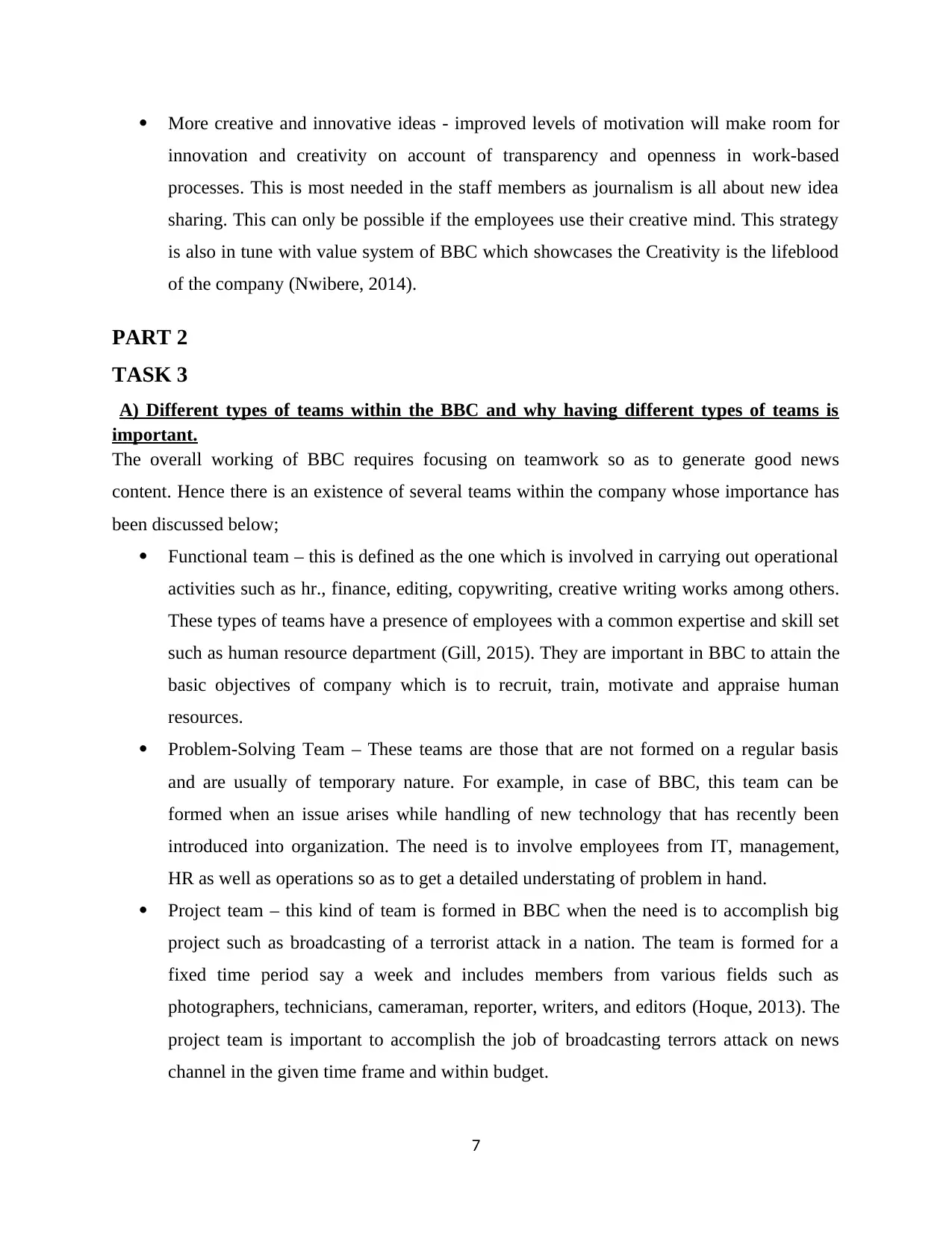
More creative and innovative ideas - improved levels of motivation will make room for
innovation and creativity on account of transparency and openness in work-based
processes. This is most needed in the staff members as journalism is all about new idea
sharing. This can only be possible if the employees use their creative mind. This strategy
is also in tune with value system of BBC which showcases the Creativity is the lifeblood
of the company (Nwibere, 2014).
PART 2
TASK 3
A) Different types of teams within the BBC and why having different types of teams is
important.
The overall working of BBC requires focusing on teamwork so as to generate good news
content. Hence there is an existence of several teams within the company whose importance has
been discussed below;
Functional team – this is defined as the one which is involved in carrying out operational
activities such as hr., finance, editing, copywriting, creative writing works among others.
These types of teams have a presence of employees with a common expertise and skill set
such as human resource department (Gill, 2015). They are important in BBC to attain the
basic objectives of company which is to recruit, train, motivate and appraise human
resources.
Problem-Solving Team – These teams are those that are not formed on a regular basis
and are usually of temporary nature. For example, in case of BBC, this team can be
formed when an issue arises while handling of new technology that has recently been
introduced into organization. The need is to involve employees from IT, management,
HR as well as operations so as to get a detailed understating of problem in hand.
Project team – this kind of team is formed in BBC when the need is to accomplish big
project such as broadcasting of a terrorist attack in a nation. The team is formed for a
fixed time period say a week and includes members from various fields such as
photographers, technicians, cameraman, reporter, writers, and editors (Hoque, 2013). The
project team is important to accomplish the job of broadcasting terrors attack on news
channel in the given time frame and within budget.
7
innovation and creativity on account of transparency and openness in work-based
processes. This is most needed in the staff members as journalism is all about new idea
sharing. This can only be possible if the employees use their creative mind. This strategy
is also in tune with value system of BBC which showcases the Creativity is the lifeblood
of the company (Nwibere, 2014).
PART 2
TASK 3
A) Different types of teams within the BBC and why having different types of teams is
important.
The overall working of BBC requires focusing on teamwork so as to generate good news
content. Hence there is an existence of several teams within the company whose importance has
been discussed below;
Functional team – this is defined as the one which is involved in carrying out operational
activities such as hr., finance, editing, copywriting, creative writing works among others.
These types of teams have a presence of employees with a common expertise and skill set
such as human resource department (Gill, 2015). They are important in BBC to attain the
basic objectives of company which is to recruit, train, motivate and appraise human
resources.
Problem-Solving Team – These teams are those that are not formed on a regular basis
and are usually of temporary nature. For example, in case of BBC, this team can be
formed when an issue arises while handling of new technology that has recently been
introduced into organization. The need is to involve employees from IT, management,
HR as well as operations so as to get a detailed understating of problem in hand.
Project team – this kind of team is formed in BBC when the need is to accomplish big
project such as broadcasting of a terrorist attack in a nation. The team is formed for a
fixed time period say a week and includes members from various fields such as
photographers, technicians, cameraman, reporter, writers, and editors (Hoque, 2013). The
project team is important to accomplish the job of broadcasting terrors attack on news
channel in the given time frame and within budget.
7
Paraphrase This Document
Need a fresh take? Get an instant paraphrase of this document with our AI Paraphraser
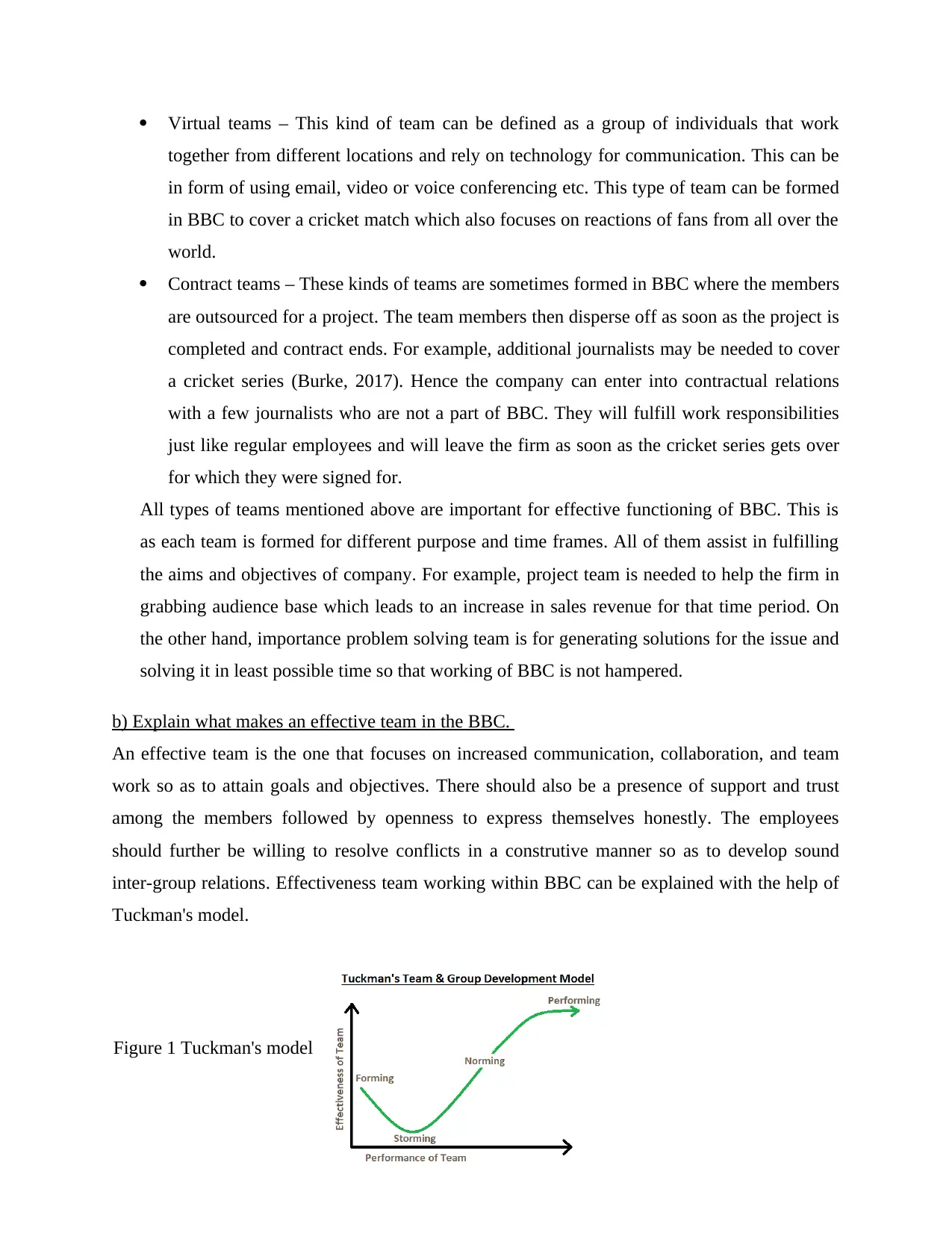
Virtual teams – This kind of team can be defined as a group of individuals that work
together from different locations and rely on technology for communication. This can be
in form of using email, video or voice conferencing etc. This type of team can be formed
in BBC to cover a cricket match which also focuses on reactions of fans from all over the
world.
Contract teams – These kinds of teams are sometimes formed in BBC where the members
are outsourced for a project. The team members then disperse off as soon as the project is
completed and contract ends. For example, additional journalists may be needed to cover
a cricket series (Burke, 2017). Hence the company can enter into contractual relations
with a few journalists who are not a part of BBC. They will fulfill work responsibilities
just like regular employees and will leave the firm as soon as the cricket series gets over
for which they were signed for.
All types of teams mentioned above are important for effective functioning of BBC. This is
as each team is formed for different purpose and time frames. All of them assist in fulfilling
the aims and objectives of company. For example, project team is needed to help the firm in
grabbing audience base which leads to an increase in sales revenue for that time period. On
the other hand, importance problem solving team is for generating solutions for the issue and
solving it in least possible time so that working of BBC is not hampered.
b) Explain what makes an effective team in the BBC.
An effective team is the one that focuses on increased communication, collaboration, and team
work so as to attain goals and objectives. There should also be a presence of support and trust
among the members followed by openness to express themselves honestly. The employees
should further be willing to resolve conflicts in a construtive manner so as to develop sound
inter-group relations. Effectiveness team working within BBC can be explained with the help of
Tuckman's model.
Figure 1 Tuckman's model
8
together from different locations and rely on technology for communication. This can be
in form of using email, video or voice conferencing etc. This type of team can be formed
in BBC to cover a cricket match which also focuses on reactions of fans from all over the
world.
Contract teams – These kinds of teams are sometimes formed in BBC where the members
are outsourced for a project. The team members then disperse off as soon as the project is
completed and contract ends. For example, additional journalists may be needed to cover
a cricket series (Burke, 2017). Hence the company can enter into contractual relations
with a few journalists who are not a part of BBC. They will fulfill work responsibilities
just like regular employees and will leave the firm as soon as the cricket series gets over
for which they were signed for.
All types of teams mentioned above are important for effective functioning of BBC. This is
as each team is formed for different purpose and time frames. All of them assist in fulfilling
the aims and objectives of company. For example, project team is needed to help the firm in
grabbing audience base which leads to an increase in sales revenue for that time period. On
the other hand, importance problem solving team is for generating solutions for the issue and
solving it in least possible time so that working of BBC is not hampered.
b) Explain what makes an effective team in the BBC.
An effective team is the one that focuses on increased communication, collaboration, and team
work so as to attain goals and objectives. There should also be a presence of support and trust
among the members followed by openness to express themselves honestly. The employees
should further be willing to resolve conflicts in a construtive manner so as to develop sound
inter-group relations. Effectiveness team working within BBC can be explained with the help of
Tuckman's model.
Figure 1 Tuckman's model
8
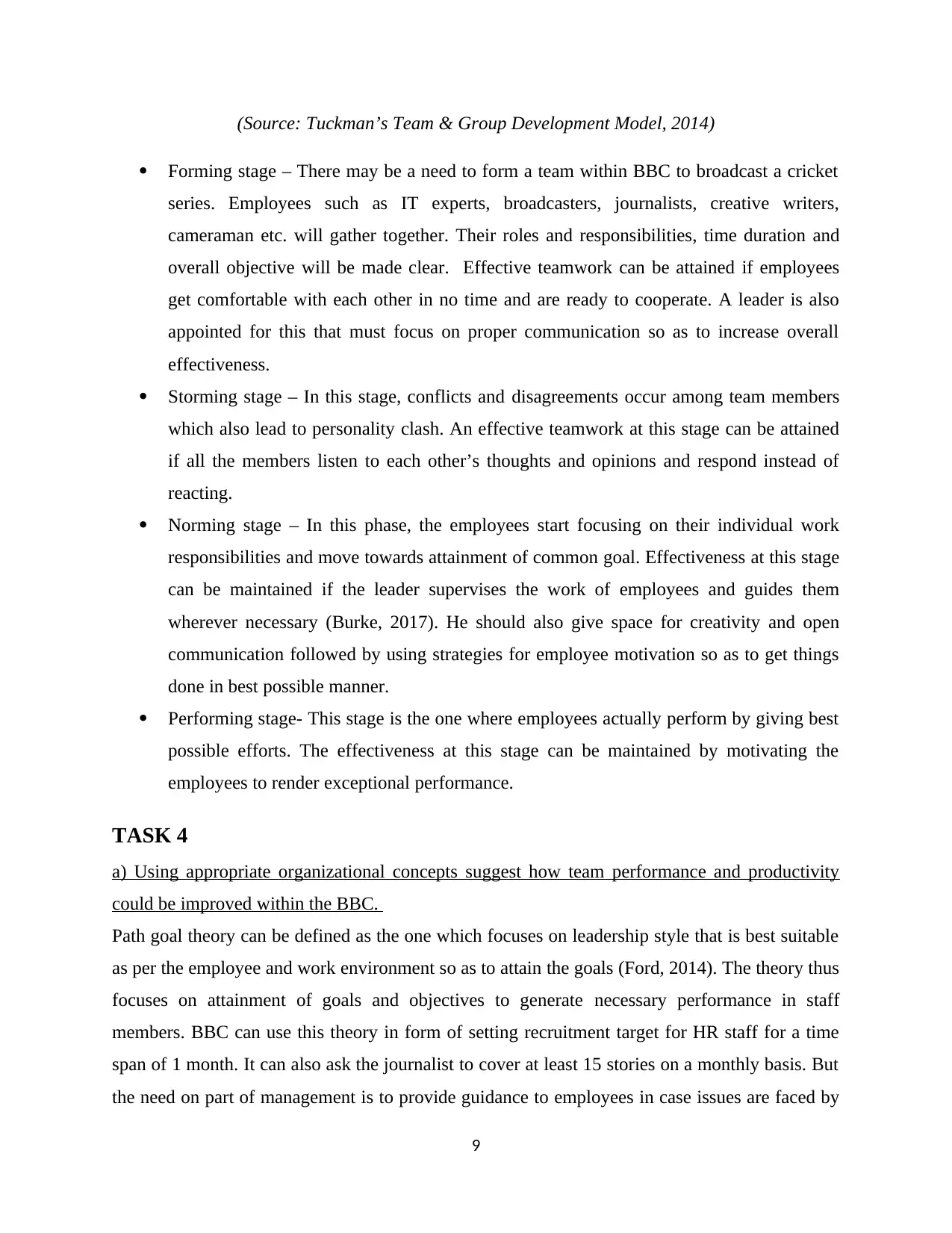
(Source: Tuckman’s Team & Group Development Model, 2014)
Forming stage – There may be a need to form a team within BBC to broadcast a cricket
series. Employees such as IT experts, broadcasters, journalists, creative writers,
cameraman etc. will gather together. Their roles and responsibilities, time duration and
overall objective will be made clear. Effective teamwork can be attained if employees
get comfortable with each other in no time and are ready to cooperate. A leader is also
appointed for this that must focus on proper communication so as to increase overall
effectiveness.
Storming stage – In this stage, conflicts and disagreements occur among team members
which also lead to personality clash. An effective teamwork at this stage can be attained
if all the members listen to each other’s thoughts and opinions and respond instead of
reacting.
Norming stage – In this phase, the employees start focusing on their individual work
responsibilities and move towards attainment of common goal. Effectiveness at this stage
can be maintained if the leader supervises the work of employees and guides them
wherever necessary (Burke, 2017). He should also give space for creativity and open
communication followed by using strategies for employee motivation so as to get things
done in best possible manner.
Performing stage- This stage is the one where employees actually perform by giving best
possible efforts. The effectiveness at this stage can be maintained by motivating the
employees to render exceptional performance.
TASK 4
a) Using appropriate organizational concepts suggest how team performance and productivity
could be improved within the BBC.
Path goal theory can be defined as the one which focuses on leadership style that is best suitable
as per the employee and work environment so as to attain the goals (Ford, 2014). The theory thus
focuses on attainment of goals and objectives to generate necessary performance in staff
members. BBC can use this theory in form of setting recruitment target for HR staff for a time
span of 1 month. It can also ask the journalist to cover at least 15 stories on a monthly basis. But
the need on part of management is to provide guidance to employees in case issues are faced by
9
Forming stage – There may be a need to form a team within BBC to broadcast a cricket
series. Employees such as IT experts, broadcasters, journalists, creative writers,
cameraman etc. will gather together. Their roles and responsibilities, time duration and
overall objective will be made clear. Effective teamwork can be attained if employees
get comfortable with each other in no time and are ready to cooperate. A leader is also
appointed for this that must focus on proper communication so as to increase overall
effectiveness.
Storming stage – In this stage, conflicts and disagreements occur among team members
which also lead to personality clash. An effective teamwork at this stage can be attained
if all the members listen to each other’s thoughts and opinions and respond instead of
reacting.
Norming stage – In this phase, the employees start focusing on their individual work
responsibilities and move towards attainment of common goal. Effectiveness at this stage
can be maintained if the leader supervises the work of employees and guides them
wherever necessary (Burke, 2017). He should also give space for creativity and open
communication followed by using strategies for employee motivation so as to get things
done in best possible manner.
Performing stage- This stage is the one where employees actually perform by giving best
possible efforts. The effectiveness at this stage can be maintained by motivating the
employees to render exceptional performance.
TASK 4
a) Using appropriate organizational concepts suggest how team performance and productivity
could be improved within the BBC.
Path goal theory can be defined as the one which focuses on leadership style that is best suitable
as per the employee and work environment so as to attain the goals (Ford, 2014). The theory thus
focuses on attainment of goals and objectives to generate necessary performance in staff
members. BBC can use this theory in form of setting recruitment target for HR staff for a time
span of 1 month. It can also ask the journalist to cover at least 15 stories on a monthly basis. But
the need on part of management is to provide guidance to employees in case issues are faced by
9
⊘ This is a preview!⊘
Do you want full access?
Subscribe today to unlock all pages.

Trusted by 1+ million students worldwide
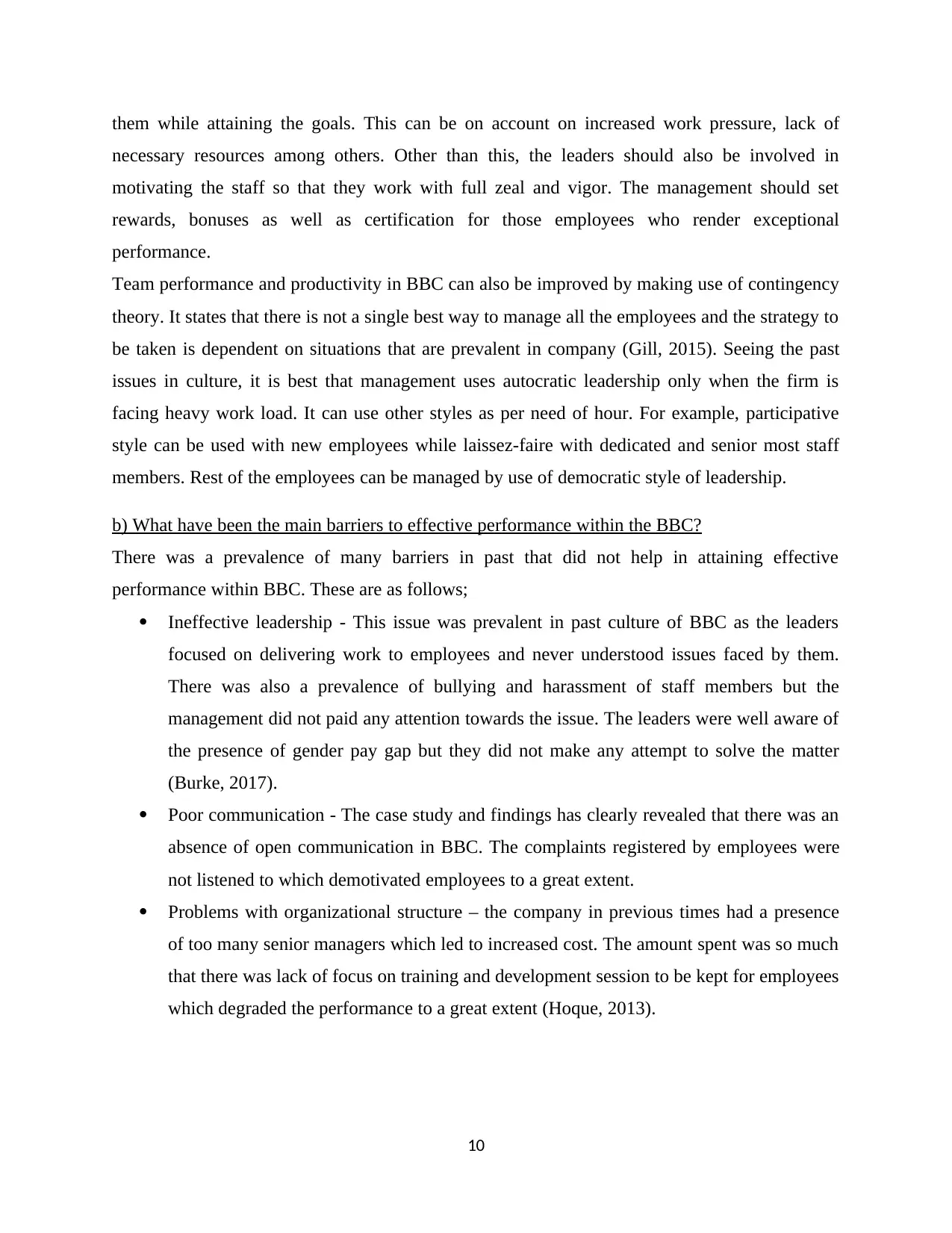
them while attaining the goals. This can be on account on increased work pressure, lack of
necessary resources among others. Other than this, the leaders should also be involved in
motivating the staff so that they work with full zeal and vigor. The management should set
rewards, bonuses as well as certification for those employees who render exceptional
performance.
Team performance and productivity in BBC can also be improved by making use of contingency
theory. It states that there is not a single best way to manage all the employees and the strategy to
be taken is dependent on situations that are prevalent in company (Gill, 2015). Seeing the past
issues in culture, it is best that management uses autocratic leadership only when the firm is
facing heavy work load. It can use other styles as per need of hour. For example, participative
style can be used with new employees while laissez-faire with dedicated and senior most staff
members. Rest of the employees can be managed by use of democratic style of leadership.
b) What have been the main barriers to effective performance within the BBC?
There was a prevalence of many barriers in past that did not help in attaining effective
performance within BBC. These are as follows;
Ineffective leadership - This issue was prevalent in past culture of BBC as the leaders
focused on delivering work to employees and never understood issues faced by them.
There was also a prevalence of bullying and harassment of staff members but the
management did not paid any attention towards the issue. The leaders were well aware of
the presence of gender pay gap but they did not make any attempt to solve the matter
(Burke, 2017).
Poor communication - The case study and findings has clearly revealed that there was an
absence of open communication in BBC. The complaints registered by employees were
not listened to which demotivated employees to a great extent.
Problems with organizational structure – the company in previous times had a presence
of too many senior managers which led to increased cost. The amount spent was so much
that there was lack of focus on training and development session to be kept for employees
which degraded the performance to a great extent (Hoque, 2013).
10
necessary resources among others. Other than this, the leaders should also be involved in
motivating the staff so that they work with full zeal and vigor. The management should set
rewards, bonuses as well as certification for those employees who render exceptional
performance.
Team performance and productivity in BBC can also be improved by making use of contingency
theory. It states that there is not a single best way to manage all the employees and the strategy to
be taken is dependent on situations that are prevalent in company (Gill, 2015). Seeing the past
issues in culture, it is best that management uses autocratic leadership only when the firm is
facing heavy work load. It can use other styles as per need of hour. For example, participative
style can be used with new employees while laissez-faire with dedicated and senior most staff
members. Rest of the employees can be managed by use of democratic style of leadership.
b) What have been the main barriers to effective performance within the BBC?
There was a prevalence of many barriers in past that did not help in attaining effective
performance within BBC. These are as follows;
Ineffective leadership - This issue was prevalent in past culture of BBC as the leaders
focused on delivering work to employees and never understood issues faced by them.
There was also a prevalence of bullying and harassment of staff members but the
management did not paid any attention towards the issue. The leaders were well aware of
the presence of gender pay gap but they did not make any attempt to solve the matter
(Burke, 2017).
Poor communication - The case study and findings has clearly revealed that there was an
absence of open communication in BBC. The complaints registered by employees were
not listened to which demotivated employees to a great extent.
Problems with organizational structure – the company in previous times had a presence
of too many senior managers which led to increased cost. The amount spent was so much
that there was lack of focus on training and development session to be kept for employees
which degraded the performance to a great extent (Hoque, 2013).
10
Paraphrase This Document
Need a fresh take? Get an instant paraphrase of this document with our AI Paraphraser
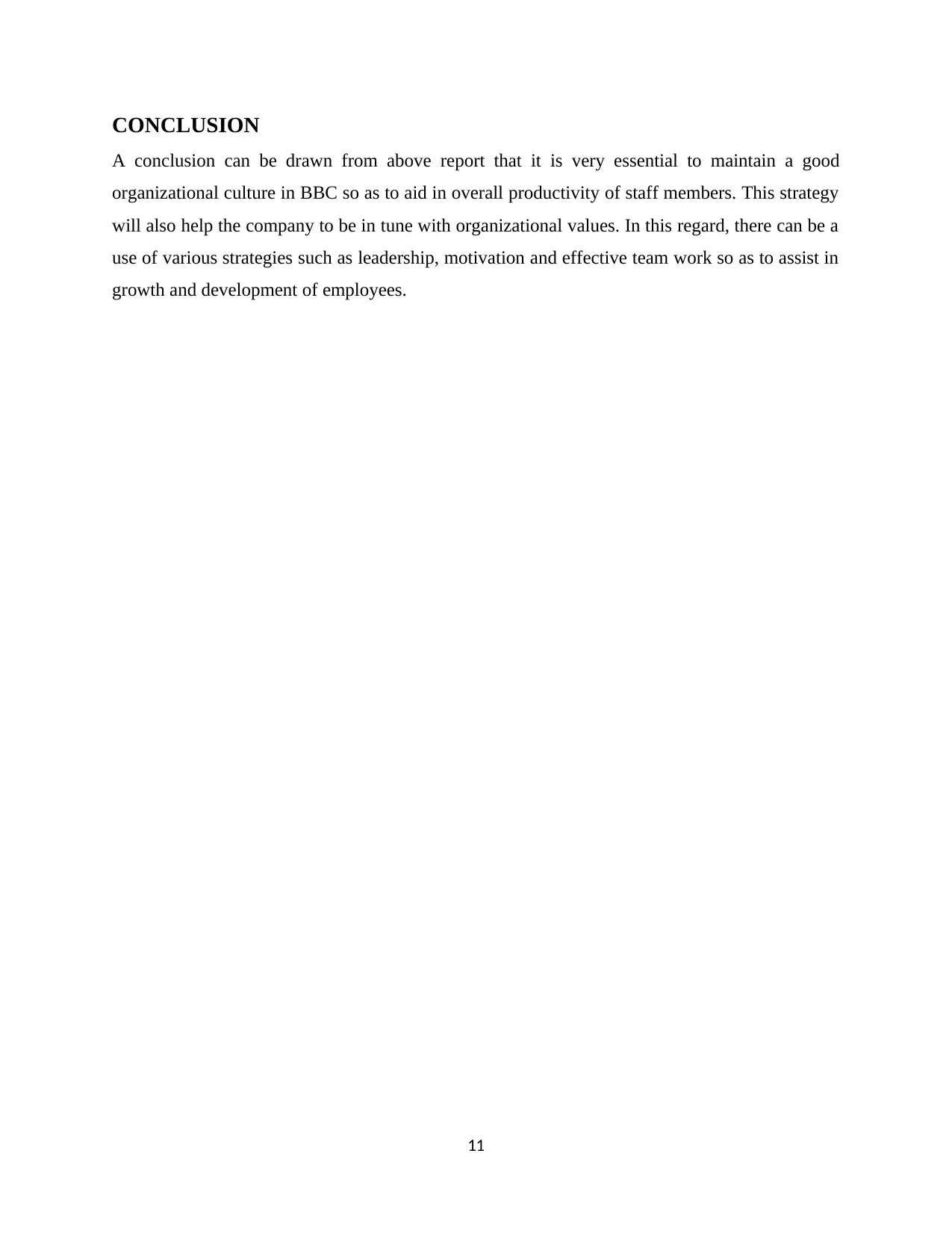
CONCLUSION
A conclusion can be drawn from above report that it is very essential to maintain a good
organizational culture in BBC so as to aid in overall productivity of staff members. This strategy
will also help the company to be in tune with organizational values. In this regard, there can be a
use of various strategies such as leadership, motivation and effective team work so as to assist in
growth and development of employees.
11
A conclusion can be drawn from above report that it is very essential to maintain a good
organizational culture in BBC so as to aid in overall productivity of staff members. This strategy
will also help the company to be in tune with organizational values. In this regard, there can be a
use of various strategies such as leadership, motivation and effective team work so as to assist in
growth and development of employees.
11
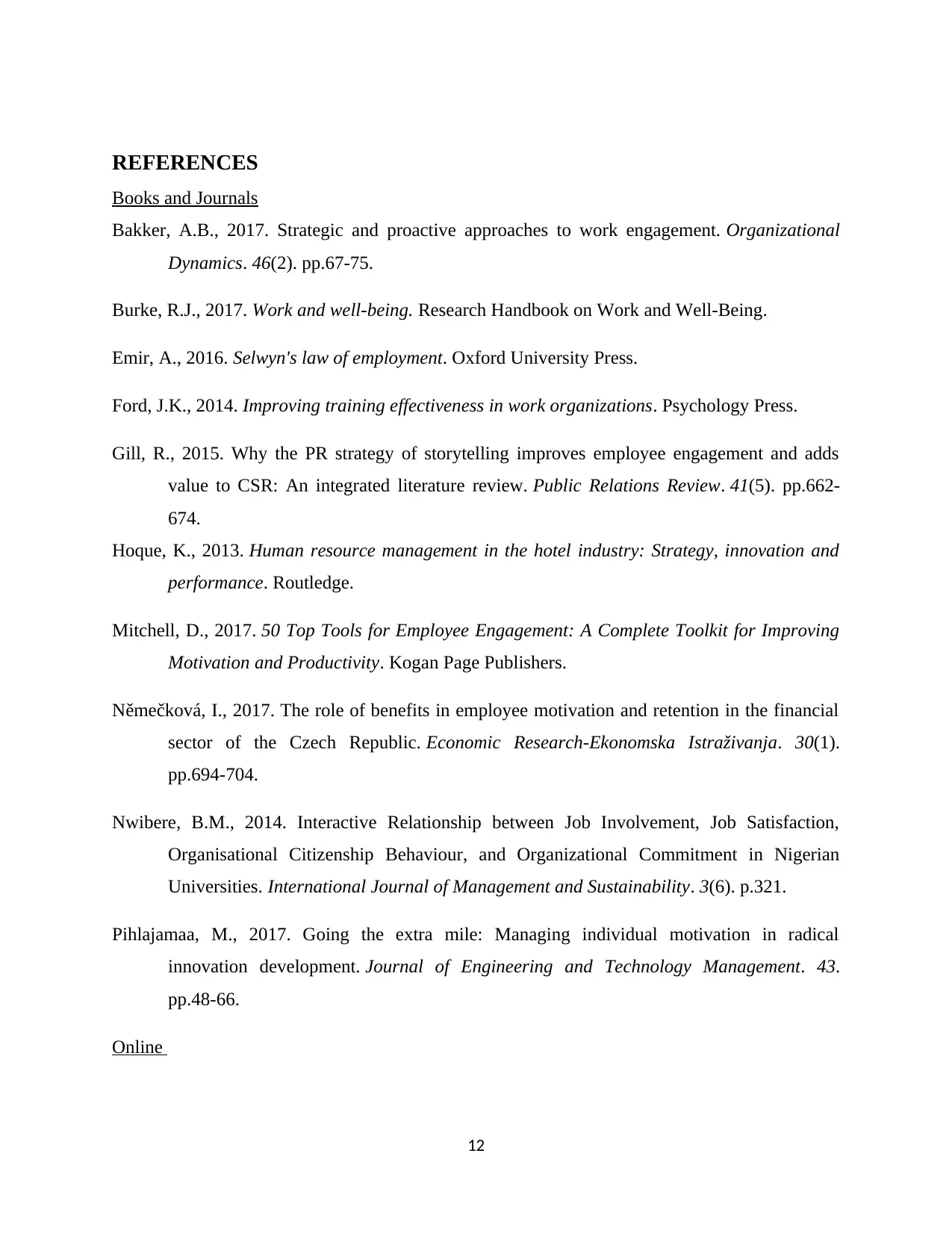
REFERENCES
Books and Journals
Bakker, A.B., 2017. Strategic and proactive approaches to work engagement. Organizational
Dynamics. 46(2). pp.67-75.
Burke, R.J., 2017. Work and well-being. Research Handbook on Work and Well-Being.
Emir, A., 2016. Selwyn's law of employment. Oxford University Press.
Ford, J.K., 2014. Improving training effectiveness in work organizations. Psychology Press.
Gill, R., 2015. Why the PR strategy of storytelling improves employee engagement and adds
value to CSR: An integrated literature review. Public Relations Review. 41(5). pp.662-
674.
Hoque, K., 2013. Human resource management in the hotel industry: Strategy, innovation and
performance. Routledge.
Mitchell, D., 2017. 50 Top Tools for Employee Engagement: A Complete Toolkit for Improving
Motivation and Productivity. Kogan Page Publishers.
Němečková, I., 2017. The role of benefits in employee motivation and retention in the financial
sector of the Czech Republic. Economic Research-Ekonomska Istraživanja. 30(1).
pp.694-704.
Nwibere, B.M., 2014. Interactive Relationship between Job Involvement, Job Satisfaction,
Organisational Citizenship Behaviour, and Organizational Commitment in Nigerian
Universities. International Journal of Management and Sustainability. 3(6). p.321.
Pihlajamaa, M., 2017. Going the extra mile: Managing individual motivation in radical
innovation development. Journal of Engineering and Technology Management. 43.
pp.48-66.
Online
12
Books and Journals
Bakker, A.B., 2017. Strategic and proactive approaches to work engagement. Organizational
Dynamics. 46(2). pp.67-75.
Burke, R.J., 2017. Work and well-being. Research Handbook on Work and Well-Being.
Emir, A., 2016. Selwyn's law of employment. Oxford University Press.
Ford, J.K., 2014. Improving training effectiveness in work organizations. Psychology Press.
Gill, R., 2015. Why the PR strategy of storytelling improves employee engagement and adds
value to CSR: An integrated literature review. Public Relations Review. 41(5). pp.662-
674.
Hoque, K., 2013. Human resource management in the hotel industry: Strategy, innovation and
performance. Routledge.
Mitchell, D., 2017. 50 Top Tools for Employee Engagement: A Complete Toolkit for Improving
Motivation and Productivity. Kogan Page Publishers.
Němečková, I., 2017. The role of benefits in employee motivation and retention in the financial
sector of the Czech Republic. Economic Research-Ekonomska Istraživanja. 30(1).
pp.694-704.
Nwibere, B.M., 2014. Interactive Relationship between Job Involvement, Job Satisfaction,
Organisational Citizenship Behaviour, and Organizational Commitment in Nigerian
Universities. International Journal of Management and Sustainability. 3(6). p.321.
Pihlajamaa, M., 2017. Going the extra mile: Managing individual motivation in radical
innovation development. Journal of Engineering and Technology Management. 43.
pp.48-66.
Online
12
⊘ This is a preview!⊘
Do you want full access?
Subscribe today to unlock all pages.

Trusted by 1+ million students worldwide
1 out of 13
Related Documents
Your All-in-One AI-Powered Toolkit for Academic Success.
+13062052269
info@desklib.com
Available 24*7 on WhatsApp / Email
![[object Object]](/_next/static/media/star-bottom.7253800d.svg)
Unlock your academic potential
Copyright © 2020–2026 A2Z Services. All Rights Reserved. Developed and managed by ZUCOL.





